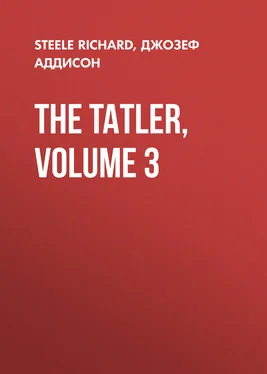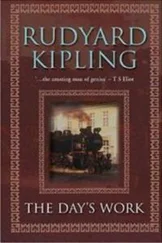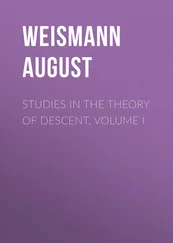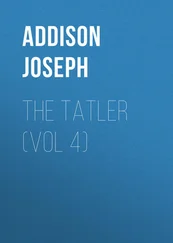Джозеф Аддисон - The Tatler, Volume 3
Здесь есть возможность читать онлайн «Джозеф Аддисон - The Tatler, Volume 3» — ознакомительный отрывок электронной книги совершенно бесплатно, а после прочтения отрывка купить полную версию. В некоторых случаях можно слушать аудио, скачать через торрент в формате fb2 и присутствует краткое содержание. Жанр: foreign_prose, foreign_antique, на английском языке. Описание произведения, (предисловие) а так же отзывы посетителей доступны на портале библиотеки ЛибКат.
- Название:The Tatler, Volume 3
- Автор:
- Жанр:
- Год:неизвестен
- ISBN:нет данных
- Рейтинг книги:4 / 5. Голосов: 1
-
Избранное:Добавить в избранное
- Отзывы:
-
Ваша оценка:
- 80
- 1
- 2
- 3
- 4
- 5
The Tatler, Volume 3: краткое содержание, описание и аннотация
Предлагаем к чтению аннотацию, описание, краткое содержание или предисловие (зависит от того, что написал сам автор книги «The Tatler, Volume 3»). Если вы не нашли необходимую информацию о книге — напишите в комментариях, мы постараемся отыскать её.
The Tatler, Volume 3 — читать онлайн ознакомительный отрывок
Ниже представлен текст книги, разбитый по страницам. Система сохранения места последней прочитанной страницы, позволяет с удобством читать онлайн бесплатно книгу «The Tatler, Volume 3», без необходимости каждый раз заново искать на чём Вы остановились. Поставьте закладку, и сможете в любой момент перейти на страницу, на которой закончили чтение.
Интервал:
Закладка:
If you would see the humour of a coquette pushed to the last excess, you may find an instance of it in the following story, which I will set down at length, because it pleased me when I read it, though I cannot recollect in what author.
A young coquette widow in France having been followed by a Gascon of quality, who had boasted among his companions of some favours which he had never received, to be revenged of him, sent for him one evening, and told him, it was in his power to do her a very particular service. The Gascon, with much profession of his readiness to obey her commands, begged to hear in what manner she designed to employ him. "You know," said the widow, "my friend Belinda, and must often have heard of the jealousy of that impotent wretch her husband. Now it is absolutely necessary, for the carrying on a certain affair, that his wife and I should be together a whole night. What I have to ask of you, is, to dress yourself in her night-clothes, and lie by him a whole night in her place, that he may not miss her while she is with me." The Gascon (though of a very lively and undertaking complexion) began to startle at the proposal. "Nay," says the widow, "if you have not the courage to go through what I ask of you, I must employ somebody else that will." "Madam," says the Gascon, "I'll kill him for you if you please; but for lying with him!—How is it possible to do it without being discovered?" "If you do not discover yourself," says the widow, "you will lie safe enough, for he is past all curiosity. He comes in at night while she is asleep, and goes out in the morning before she awakes, and is in pain for nothing, so he knows she is there." "Madam," replied the Gascon, "how can you reward me for passing a night with this old fellow?" The widow answered with a laugh, "Perhaps by admitting you to pass a night with one you think more agreeable." He took the hint, put on his night-clothes, and had not been a-bed above an hour before he heard a knocking at the door, and the treading of one who approached the other side of the bed, and who he did not question was the good man of the house. I do not know, whether the story would be better by telling you in this place, or at the end of it, that the person who went to bed to him was our young coquette widow. The Gascon was in a terrible fright every time she moved in the bed, or turned towards him, and did not fail to shrink from her till he had conveyed himself to the very ridge of the bed. I will not dwell upon the perplexity he was in the whole night, which was augmented, when he observed that it was now broad day, and that the husband did not yet offer to get up and go about his business. All that the Gascon had for it, was to keep his face turned from him, and to feign himself asleep, when, to his utter confusion, the widow at last puts out her arm, and pulls the bell at her bed's head. In came her friend, and two or three companions, to whom the Gascon had boasted of her favours. The widow jumped into a wrapping-gown, and joined with the rest in laughing at this man of intrigue. 55 55 " Advertisement. —Proposals for printing the Lucubrations of Isaac Bickerstaff, Esq., by subscriptions, are to be seen, and subscriptions taken by Charles Lillie, a perfumer, at the corner of Beaufort Buildings, in the Strand, and John Morphew, near Stationers Hall." See No. 80, note. The same proposals are advertised at the end of the subsequent papers in the original folio, with the following variation and addition: Proposals for printing, &c. by subscriptions, "in two volumes in octavo, on a large character and fine royal paper," &c. In No. 134, &c., there was this addition: "All persons that desire to subscribe to this work are desired to send their subscriptions before the 25th instant, it being intended to print no more than what shall be subscribed for, and to begin on the 27th in order to have it published before Easter." In No. 139 (Feb. 25-28) was the announcement, "this day put to press." The idea of publishing by Easter was given up after No. 153. The books were not ready for the subscribers until July 10 (see No. 195, Advertisement). The third and fourth volumes of the Tatler were advertised as "ready to be delivered" in No. 227 of the Spectator (Nov. 20, 1711). The copies on royal paper were issued at a guinea a volume, and copies on medium paper at half a guinea. "I am one of your two-guinea subscribers," says the writer of No. 5 of the Examiner (Aug. 31, 1710).
No. 127
Nimirum insanus paucis videatur, eo quod
Maxima pars hominum morbo jactatur eodem.
Hor., 2 Sat. iii. 120.There is no affection of the mind so much blended in human nature, and wrought into our very constitution, as pride. It appears under a multitude of disguises, and breaks out in ten thousand different symptoms. Every one feels it in himself, and yet wonders to see it in his neighbour. I must confess, I met with an instance of it the other day where I should very little have expected it. Who would believe the proud person I am going to speak of, is a cobbler upon Ludgate Hill? This artist being naturally a lover of respect, and considering that his circumstances are such that no man living will give it him, has contrived the figure of a beau in wood, who stands before him in a bending posture, with his hat under his left arm, and his right hand extended in such a manner as to hold a thread, a piece of wax, or an awl, according to the particular service in which his master thinks fit to employ him. When I saw him, he held a candle in this obsequious posture. I was very well pleased with the cobbler's invention, that had so ingeniously contrived an inferior, and stood a little while contemplating this inverted idolatry, wherein the image did homage to the man. When we meet with such a fantastic vanity in one of this order, it is no wonder if we may trace it through all degrees above it, and particularly through all the steps of greatness. We easily see the absurdity of pride when it enters into the heart of a cobbler; though in reality it is altogether as ridiculous and unreasonable wherever it takes possession of a human creature. There is no temptation to it from the reflection upon our being in general, or upon any comparative perfection, whereby one man may excel another. The greater a man's knowledge is, the greater motive he may seem to have for pride; but in the same proportion as the one rises, the other sinks, it being the chief office of wisdom to discover to us our weaknesses and imperfections.
As folly is the foundation of pride, the natural superstructure of it is madness. If there was an occasion for the experiment, I would not question to make a proud man a lunatic in three weeks' time, provided I had it in my power to ripen his frenzy with proper applications. It is an admirable reflection in Terence, where it is said of a parasite, " Hic homines ex stultis facit insanos! " 56 56 "Eunuchus," II. ii. 23. See No. 208.
"This fellow,' says he, "has an art of converting fools into madmen." When I was in France (the region of complaisance and vanity), I have often observed, that a great man who has entered a levy of flatterers humble and temperate, has grown so insensibly heated by the court which was paid him on all sides, that he has been quite distracted before he could get into his coach.
If we consult the collegiates of Moorfields, we shall find most of them are beholden to their pride for their introduction into that magnificent palace. 57 57 Bedlam.
I had some years ago the curiosity to inquire into the particular circumstances of these whimsical freeholders, and learned from their own mouths the condition and character of each of them. Indeed I found, that all I spoke to were persons of quality. There were at that time five duchesses, three earls, two heathen gods, an emperor, and a prophet. There were also a great number of such as were locked up from their estates, and others who concealed their titles. A leather-seller of Taunton whispered me in my ear, that he was the Duke of Monmouth; but begged me not to betray him. At a little distance from him sat a tailor's wife, who asked me as I went by, if I had seen the sword-bearer? Upon which I presumed to ask her, who she was; and was answered, "My Lady Mayoress."
Интервал:
Закладка:
Похожие книги на «The Tatler, Volume 3»
Представляем Вашему вниманию похожие книги на «The Tatler, Volume 3» списком для выбора. Мы отобрали схожую по названию и смыслу литературу в надежде предоставить читателям больше вариантов отыскать новые, интересные, ещё непрочитанные произведения.
Обсуждение, отзывы о книге «The Tatler, Volume 3» и просто собственные мнения читателей. Оставьте ваши комментарии, напишите, что Вы думаете о произведении, его смысле или главных героях. Укажите что конкретно понравилось, а что нет, и почему Вы так считаете.












